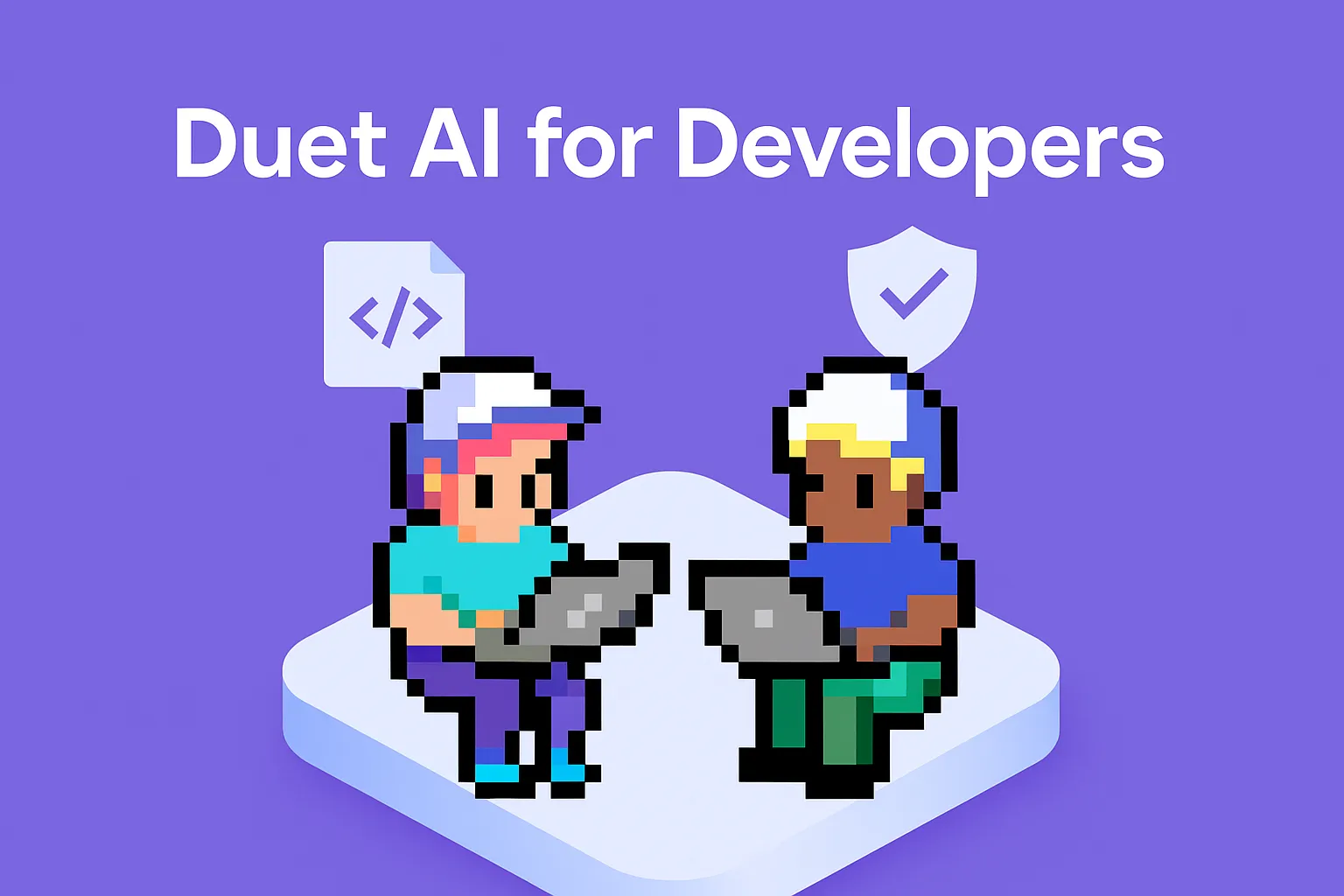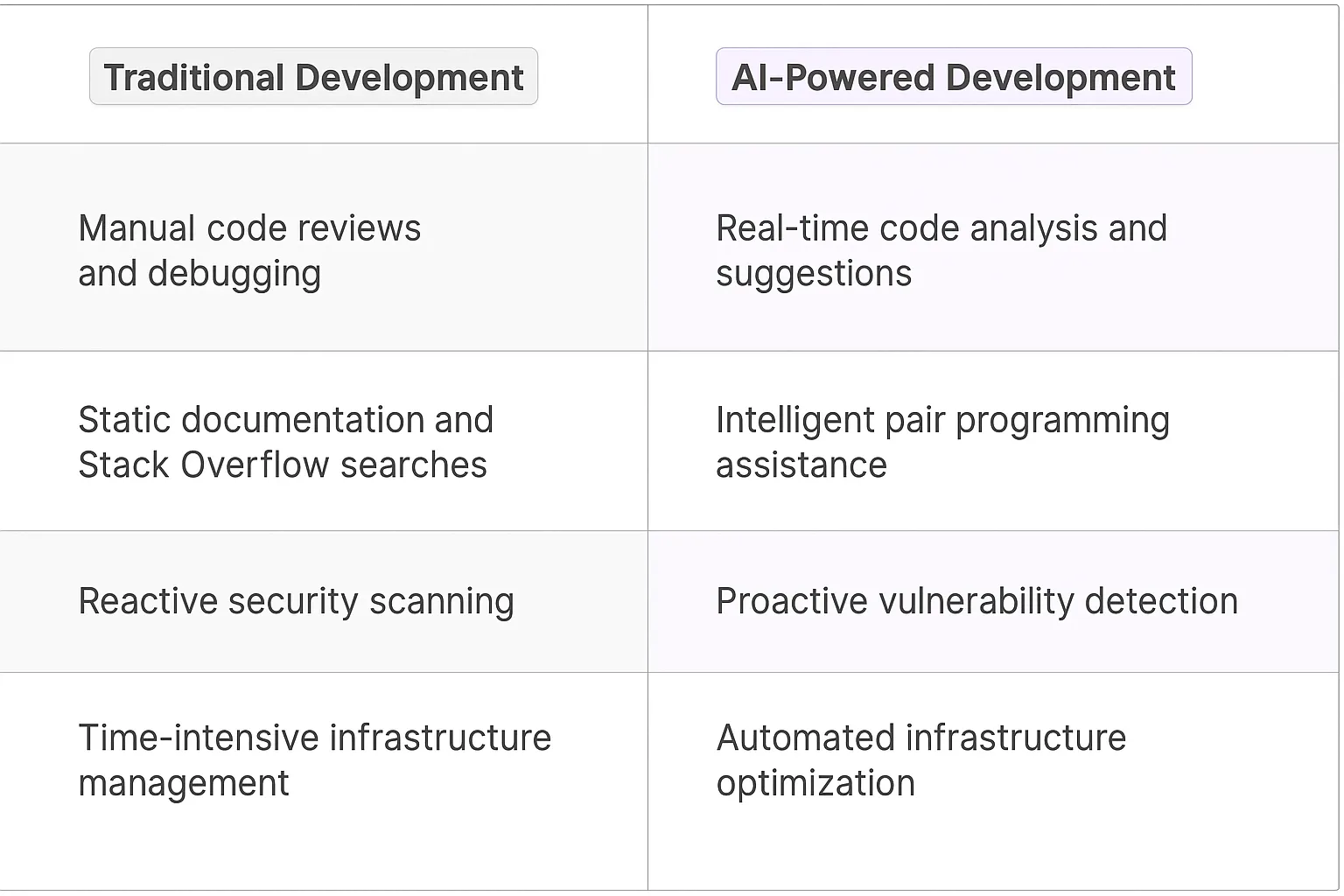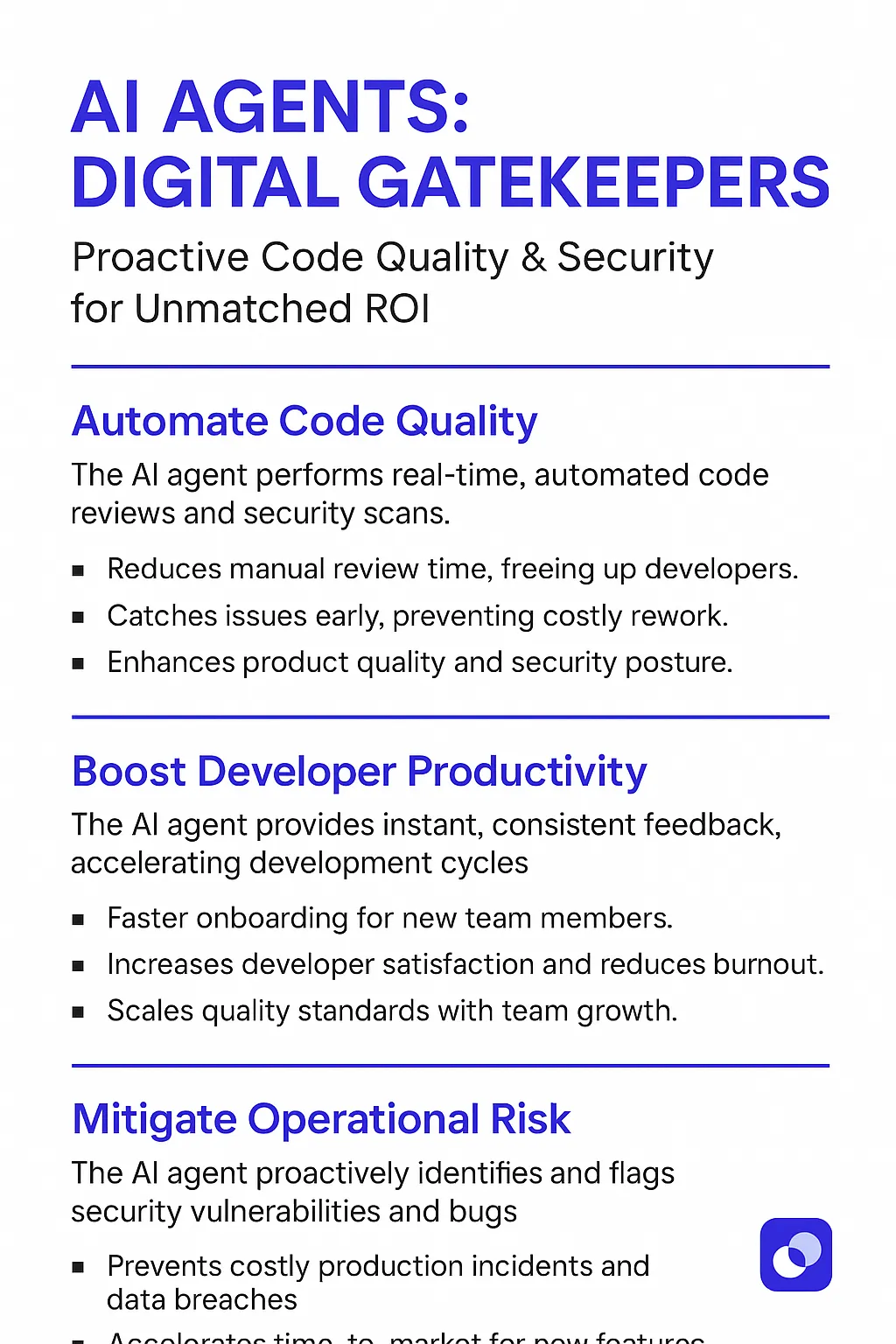Duet AI
Understanding Duet AI's Role in Modern Development
Duet AI operates as a sophisticated digital teammate within Google Cloud's ecosystem, combining advanced machine learning with deep coding expertise. Unlike traditional development tools, it actively participates in the development process by analyzing code patterns, suggesting improvements, and automating routine tasks. The technology learns from each interaction, building a deep understanding of an organization's specific coding practices and technical requirements.
Key Features of Duet AI
The platform excels in real-time code analysis, offering intelligent suggestions that go beyond basic syntax checking. It generates comprehensive test suites, provides context-aware documentation, and maintains continuous security scanning. The system's ability to learn from existing codebases creates a powerful knowledge repository that grows more valuable over time. Through natural language processing, it translates complex technical concepts into clear, actionable insights.

Benefits of AI Agents for Duet AI
What would have been used before AI Agents?
Software development teams traditionally relied on static documentation, StackOverflow threads, and endless GitHub searches to solve coding challenges. Developers spent countless hours combing through documentation, asking colleagues for help, or manually debugging issues. Code reviews and quality assurance required dedicated human reviewers who could only process a limited amount of code per day.
What are the benefits of AI Agents?
Duet AI fundamentally transforms the software development lifecycle by acting as an expert pair programmer that never sleeps. The AI analyzes code in real-time, spots potential bugs before they become problems, and suggests optimizations that human developers might miss.
The most compelling aspect is how Duet AI learns from an organization's existing codebase. It understands company-specific coding patterns and best practices, essentially becoming a repository of institutional knowledge. This means new team members can get up to speed faster, while experienced developers can maintain consistency across projects.
Code generation capabilities go beyond simple autocomplete - Duet AI can draft entire functions based on natural language descriptions, handling edge cases and following established patterns. For testing, it automatically generates comprehensive test suites that cover scenarios human testers might overlook.
The real power lies in Duet AI's ability to explain complex code sections, suggest architectural improvements, and provide context-aware documentation. This reduces technical debt and makes codebases more maintainable over time. Teams using Duet AI report spending less time on repetitive tasks and more time on creative problem-solving and innovation.
Security scanning happens continuously, with Duet AI flagging potential vulnerabilities and suggesting fixes based on current best practices. This proactive approach to security helps teams catch issues early in the development cycle when they're least expensive to fix.

Potential Use Cases of Duet AI
Software Development Acceleration
Duet AI functions as a coding co-pilot within Google Cloud's development environment. It analyzes code patterns, suggests completions, and helps developers maintain consistent coding standards across projects. When a developer starts writing a new function, Duet AI can propose entire code blocks based on the context and previous patterns in the codebase.
Infrastructure Management
System administrators leverage Duet AI to optimize cloud infrastructure configurations. The AI analyzes usage patterns and suggests resource allocation adjustments, helping teams maintain optimal performance while controlling costs. It can detect potential issues before they impact production systems and recommend preventive measures.
Security Enhancement
Security teams work alongside Duet AI to identify vulnerabilities in code and infrastructure. It continuously scans for security risks, suggests fixes for common vulnerabilities, and helps implement security best practices. When new security threats emerge, Duet AI helps teams respond quickly with targeted recommendations.
Documentation Generation
Technical writers and developers use Duet AI to create and maintain documentation. The AI analyzes code and generates clear, accurate documentation that follows team standards. It helps keep documentation synchronized with code changes, reducing the manual effort needed to maintain technical documentation.
Cloud Cost Optimization
Finance and DevOps teams work with Duet AI to optimize cloud spending. The AI identifies underutilized resources, suggests more cost-effective configurations, and helps teams implement FinOps best practices. It provides specific recommendations for rightsizing instances and managing resource allocation.
API Integration
Developers use Duet AI to accelerate API integration work. The AI understands API documentation, suggests appropriate implementation patterns, and helps troubleshoot integration issues. It can generate sample code for common API interactions and help developers understand complex API responses.
Performance Monitoring
Operations teams rely on Duet AI to monitor and optimize application performance. The AI analyzes performance metrics, identifies bottlenecks, and suggests specific improvements. When performance issues arise, it helps teams quickly identify root causes and implement solutions.
Key Tasks
- Code review and quality assurance
- Infrastructure configuration management
- Security vulnerability assessment
- Technical documentation updates
- Cost optimization analysis
- API integration development
- Performance optimization
- Incident response and troubleshooting

Industry Use Cases
Duet AI brings a fascinating shift in how different sectors approach their core operations. Drawing from my experience analyzing tech adoption patterns, I've observed Duet AI's impact across multiple industries - each with its own unique implementation story. The technology adapts to specific industry contexts, much like how early cloud computing found distinct applications across different business sectors.
What makes Duet AI particularly compelling is its ability to scale specialized knowledge within organizations. Rather than replacing existing workflows, it enhances them by serving as a bridge between technical and non-technical teams. This creates a multiplier effect where domain expertise gets amplified through AI-powered collaboration.
Looking at real-world applications, we're seeing patterns emerge where Duet AI becomes deeply integrated into daily operations. The technology moves beyond simple task automation into a realm of augmented decision-making and specialized knowledge distribution. This shift represents a fundamental change in how organizations leverage AI - from a tool-based approach to an integrated digital teammate model.
The following industry examples demonstrate how different sectors are adapting Duet AI to their specific needs, creating new operational models that weren't possible before. Each case reveals unique patterns of implementation and value creation that other organizations can learn from and adapt.
Education: How Duet AI Transforms Learning Environments
The education sector stands at a pivotal moment where AI integration isn't just beneficial - it's becoming essential. Duet AI brings specific capabilities that address long-standing challenges in academic environments.
Teachers spend an average of 11 hours per week on administrative tasks like grading and lesson planning. Duet AI reduces this burden by generating first drafts of lesson plans, creating rubrics, and providing quick summaries of student submissions. When a teacher needs to craft individualized feedback for 30+ students, Duet AI analyzes each submission and suggests specific, constructive comments.
For collaborative projects, Duet AI acts as a real-time writing coach and research partner. Students working on group presentations can receive instant feedback on their slides, while Duet AI suggests relevant data points and sources to strengthen their arguments. The technology adapts to different grade levels, providing age-appropriate assistance without doing the work for students.
A particularly powerful application emerges in special education, where Duet AI helps teachers customize learning materials for different learning styles. The AI can quickly reformulate explanations, generate alternative examples, and create modified assignments - tasks that typically require hours of manual adaptation.
The data shows promising results: Schools implementing Duet AI report up to 40% reduction in administrative workload for teachers and a 25% increase in student engagement during collaborative projects. These aren't just efficiency gains - they represent more time for meaningful teacher-student interactions and personalized learning experiences.
Looking at the adoption curve, education technology leaders are moving beyond viewing AI as an experimental tool and increasingly seeing it as core infrastructure for modern learning environments. This shift mirrors earlier transformations in education, like the integration of interactive whiteboards or learning management systems, but with potentially more profound implications for personalized learning at scale.
Healthcare: Duet AI Redefines Patient Care Coordination
The healthcare industry faces a critical challenge: medical professionals spend 49% of their time on documentation rather than patient care. Duet AI tackles this head-on by transforming how healthcare teams collaborate and manage patient information.
When clinicians need to summarize complex patient histories or create treatment plans, Duet AI analyzes historical records and generates comprehensive drafts that maintain medical accuracy while following HIPAA compliance. During team handoffs between shifts, the technology helps synthesize key patient updates and flags critical information that incoming staff need to know.
A fascinating pattern emerges in surgical departments using Duet AI: pre-operative planning becomes significantly more efficient. Surgical teams use the technology to draft detailed procedural notes, coordinate equipment requirements, and ensure all team members understand their roles. The result? A 35% reduction in pre-op planning time and a 28% decrease in communication-related delays.
The network effects in healthcare settings are particularly compelling. As more departments adopt Duet AI, the quality of cross-functional collaboration improves exponentially. Radiologists share findings with oncologists more effectively, while nurses and physicians coordinate care plans with unprecedented clarity.
Data from early adopter hospitals shows a 45% reduction in documentation time and a 30% improvement in team coordination metrics. But the real magic happens in unexpected areas - like how residents use Duet AI to practice patient communications or how rural clinics leverage it to access specialist knowledge.
The technology's impact scales differently in healthcare compared to other industries. While most productivity tools show linear improvements, Duet AI's benefits compound as medical teams develop new workflows around its capabilities. This creates a powerful moat for organizations that implement it early and invest in team training.
The growth trajectory suggests healthcare organizations are moving beyond basic AI implementation toward sophisticated integration with clinical workflows. This shift mirrors the adoption curve of electronic health records, but with a crucial difference: Duet AI actively reduces rather than adds to clinician workload.
Considerations and Challenges
Implementing Duet AI requires careful planning and strategic thinking around several key areas. The technical architecture must support real-time collaboration while maintaining data security and user privacy. Organizations need to evaluate their existing tech stack compatibility and plan for potential integration hurdles.
Technical Considerations
The computational requirements for running Duet AI at scale can be significant. Teams need robust infrastructure to handle concurrent users and complex workflows. API rate limits, latency issues, and service dependencies all factor into the technical implementation strategy.
Data governance becomes critical as Duet AI interacts with sensitive business information. Organizations must implement proper access controls, audit logging, and encryption protocols. The system needs to maintain compliance with industry regulations while still delivering responsive performance.
Operational Challenges
Change management proves to be one of the biggest hurdles in Duet AI adoption. Teams often struggle with varying levels of AI literacy and comfort. Some employees may resist incorporating AI tools into their workflow, while others might over-rely on them.
Training requirements extend beyond just using the tool - teams need to understand appropriate use cases, limitations, and best practices. Creating clear guidelines around AI usage helps prevent misuse while encouraging productive adoption.
Cost Considerations
The pricing model for Duet AI scales with usage, making cost management essential. Organizations need to monitor utilization patterns and implement controls to prevent unexpected spending spikes. ROI calculations should factor in both direct costs and indirect expenses like training and support.
Teams often underestimate the resources needed for ongoing maintenance, updates, and optimization. Setting realistic budgets requires understanding both the initial implementation costs and long-term operational requirements.
Transformative Impact of AI-Powered Development
The adoption of Duet AI marks a fundamental shift in how organizations approach software development and cloud operations. Its impact extends beyond mere productivity gains, creating new possibilities for collaboration between humans and AI systems. While challenges exist in implementation and change management, the technology's ability to learn and adapt to specific organizational needs makes it a powerful tool for digital transformation. Organizations that successfully integrate Duet AI position themselves to build more resilient, efficient, and innovative technical operations.













